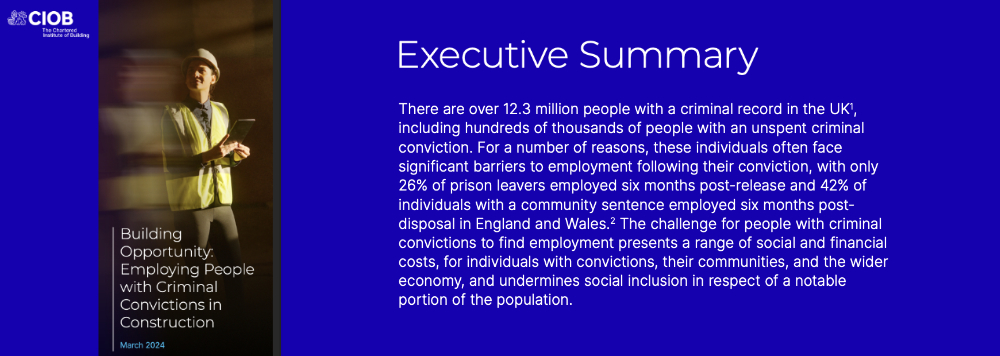Employing People with Criminal Convictions in Construction
This report looks into the barriers and opportunities to recruit people with a criminal conviction into the sector.
Negative stigma and a lack of proper training opportunities are blocking many people with criminal records from earning a second chance at life within the construction industry, a Chartered Institute of Building (CIOB) report has revealed.
The report, Building Opportunity: Employing People with Criminal Convictions in Construction, shows individuals with a criminal record often face significant barriers to gaining employment within the industry including perceived risk to the business by employers and fears about business reputation. However, the report also shows that many construction businesses are taking proactive steps to make recruitment more accessible for people with criminal convictions.
It urges the Government to break down barriers and provide more accessible training opportunities to improve individual’s employability and ease the skills shortage in the construction industry.
Statistics show nearly 70 per cent of people leaving prison* are still without work six months after their release. CIOB says breaking down barriers could lower unemployment amongst people with criminal convictions and increase construction companies' social value impact.
A copy of the full report can be accessed via this link Employing People with Criminal Convictions in Construction report
Please note following a request from the New Futures Network (NFN), this statistic has been changed from nearly 75 per cent to nearly 70 per cent.
This article appears on the CION news and blog site as "Employing People with Criminal Convictions in Construction" dated March 12, 2024 and was written by Niamh Evans
[edit] Related articles on Designing Buildings
- Apprenticeships for prisoners.
- Building back better with apprenticeships.
- CIOB aims to help ex-offenders build a career in construction.
- Construction apprenticeships.
- Ex-offender Community.
- Industry work placement.
- Projects deliver meaningful change at young offenders institution.
- Non-residential institution.
- Residential institution.
- Secure residential institution.
- Tackling the construction skills shortage.
Featured articles and news
Scottish parents prioritise construction and apprenticeships
CIOB data released for Scottish Apprenticeship Week shows construction as top potential career path.
From a Green to a White Paper and the proposal of a General Safety Requirement for construction products.
Creativity, conservation and craft at Barley Studio. Book review.
The challenge as PFI agreements come to an end
How construction deals with inherited assets built under long-term contracts.
Skills plan for engineering and building services
Comprehensive industry report highlights persistent skills challenges across the sector.
Choosing the right design team for a D&B Contract
An architect explains the nature and needs of working within this common procurement route.
Statement from the Interim Chief Construction Advisor
Thouria Istephan; Architect and inquiry panel member outlines ongoing work, priorities and next steps.
The 2025 draft NPPF in brief with indicative responses
Local verses National and suitable verses sustainable: Consultation open for just over one week.
Increased vigilance on VAT Domestic Reverse Charge
HMRC bearing down with increasing force on construction consultant says.
Call for greater recognition of professional standards
Chartered bodies representing more than 1.5 million individuals have written to the UK Government.
Cutting carbon, cost and risk in estate management
Lessons from Cardiff Met’s “Halve the Half” initiative.
Inspiring the next generation to fulfil an electrified future
Technical Manager at ECA on the importance of engagement between industry and education.
Repairing historic stone and slate roofs
The need for a code of practice and technical advice note.
Environmental compliance; a checklist for 2026
Legislative changes, policy shifts, phased rollouts, and compliance updates to be aware of.





















